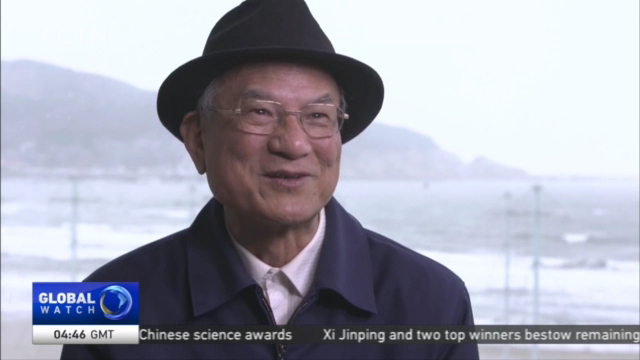
13:13, 08-Jan-2019
State Science & Technology Awards: New radar system earns high-profile national recognition
Updated
13:01, 11-Jan-2019
04:24

The findings of one of the top winners, Liu Yongtan, are expected to improve radar detection systems. CGTN's Gary Anglebrandt takes a closer look at the man behind China's latest discovery, which could transform the way we use satellite networks.
Liu Yongtan is one of two scientists to receive the highest honor of the National Science and Technology award for 2018. Liu has been recognized for his work in Array Signal Processing and Faint Signal Detection. His latest findings aim to improve how radars detect signals by allowing for the reading of faint signals on land, air, and sea, a useful trick that could change the future of satellite networks. Speaking of his accomplishments, Liu attributed teamwork and a childhood dream to his success.
LIU YONGTAN, PROFESSOR SCHOOL OF ELECTRONICS AND INFORMATION SHANGHAI JIAO TONG UNIVERSITY "This is a team effort, I couldn't have done it on my own. We're not geniuses; we're mediocre people, who were able to bring together and materialize the ideals of intellectuals and those from my own childhood. And, having achieved that brings about a heartfelt feeling."
Born in Eastern China's Jiangsu Province in the late 1930s, some of Liu Yongtan's earliest memories were that of war and chaos. When asked what drove him to the path of science, the answer was simple: the need to survive.
LIU YONGTAN, PROFESSOR SCHOOL OF ELECTRONICS AND INFORMATION SHANGHAI JIAO TONG UNIVERSITY "I was born in 1936. I was one-year-old when we fled, before the fall of Nanjing, to Chongqing; I was four when we got there. When I was five, I saw dead bodies floating in the river where it was bombed by Japanese airplanes. So you can imagine how cruel it was back then and the sense that I need to be strong so that my country can be stronger, so that its people will never be bullied like this again."
Liu soon found that strength in science, or more specifically, in the study of radars and their power in shaping national security. What followed was decades of dedicated work and research in electronic machinery and radio engineering at multiple high-profile institutes. These include Tsinghua University, the Institute of Electronic Engineering and Technology, Harbin University, Ministry of Aeronautics and Astronautics, and the Chinese Radar Society. At the age of 42, Liu was among one of the first groups of Chinese students to study abroad in the UK at the recommendation of his alma mater, Harbin University. With the UK being one of the earliest pioneers in the development of radar technology, Liu felt the pressure to perform.
LIU YONGTAN, PROFESSOR SCHOOL OF ELECTRONICS AND INFORMATION SHANGHAI JIAO TONG UNIVERSITY "We realized how behind we were when we got there, so many of us were hungry for knowledge. We barely slept, and would often awaken to a thought to go back to studying again. That was the state I was in. I was an associate professor when I went abroad but the school questioned my credentials, so I was given tests to evaluate my knowledge. Many of us also published papers while there, but they had to be published with the schools in the UK and not China, so I decided to come back. Plus, at the time, China had already begun developing radar technology."
But with China just entering the preliminary stages of radar development, Liu's ambitions were met with doubt.
LIU YONGTAN, PROFESSOR SCHOOL OF ELECTRONICS AND INFORMATION SHANGHAI JIAO TONG UNIVERSITY "It was the beginning of China's reform and opening-up and people didn't really believe in our ideas of a new radar system. I had limited data to work off of when I first started. Most data I had was of the ocean's influence on radio waves, which at the time was useless. After a while, my team members started to have doubts about the project's long-term feasibility."
Even so, Liu pressed on. Together with his team, they were able to gather enough data to secure their first funding from Harbin University to kick-start the project. Through countless hours of hard work, in 1991 Liu was elected academician of the Chinese Academy of Sciences and academician of the Chinese Academy of Engineering in 1994. Looking back now, Liu said his accomplishments wouldn't have amounted to what they are today without a bit of luck and support from his country.
LIU YONGTAN, PROFESSOR SCHOOL OF ELECTRONICS AND INFORMATION SHANGHAI JIAO TONG UNIVERSITY "All this is because of the reform and opening-up policy. With it, we were able to broaden our horizons. China had a lot of catching up to do, but the timing was on our side, even if we didn't even have enough initial funding towards the end to do and experience the things we did."
Gary Anglebrandt, CGTN.

SITEMAP
Copyright © 2018 CGTN. Beijing ICP prepared NO.16065310-3
Copyright © 2018 CGTN. Beijing ICP prepared NO.16065310-3